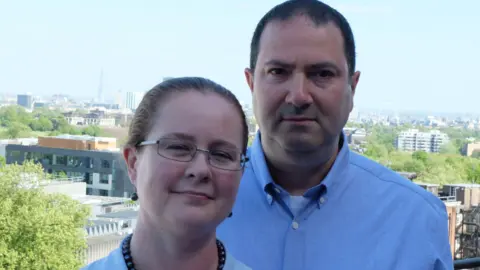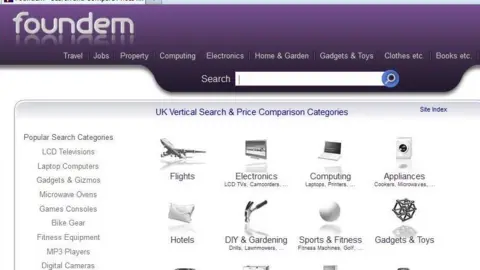ARTICLE AD BOX

 Shivaun and Adam Raff
Shivaun and Adam Raff
Shivaun Raff and her husband, Adam, have been locked in a long-running legal battle with Google
"Google essentially disappeared us from the internet."
Launch days. They’re equal parts thrilling and terrifying for many start-up business founders, but they don’t get much worse than the one Shivaun Raff and her husband, Adam, experienced.
It was June 2006 and the couple’s trailblazing price comparison website Foundem - one they had sacrificed well-paid jobs for and built from scratch - had just gone fully live.
They didn’t know it at the time but that day, and those that followed, would mark the beginning of the end for their company.
Foundem had been hit by a Google search penalty, prompted by one of the search engine’s automatic spam filters. It pushed the website way down the lists of search results for relevant queries like "price comparison" and "comparison shopping".
It meant the couple’s website, which charged a fee when customers clicked on their product listings through to other websites, struggled to make any money.
"We were monitoring our pages and how they were ranking, and then we saw them all plummet almost immediately, " says Adam.
While the launch day for Foundem didn't go to plan, it would lead to the start of something else – a 15-year legal battle that culminated in a then record €2.4bn (£2bn) fine for Google, which was deemed to have abused its market dominance.
The case has been hailed as a landmark moment in the global regulation of Big Tech.
Google spent seven years fighting that verdict, issued in June 2017, but in September this year Europe’s top court – the European Court of Justice – rejected its appeals.
Speaking to Radio 4’s The Bottom Line in their first interview since that final verdict, Shivaun and Adam explained that at first, they thought their website’s faltering start had simply been a mistake.
“We initially thought this was collateral damage, that we had been false positive detected as spam,” says Shivaun, 55. “We just assumed we had to escalate to the right place and it would be overturned.”
"If you're denied traffic, then you have no business," adds Adam, 58.
The couple sent Google numerous requests to have the restriction lifted but, more than two years later, nothing had changed and they said they received no response.
Meanwhile, their website was "ranking completely normally" on other search engines, but that didn't really matter, according to Shivaun, as "everyone's using Google".
The couple would later discover that their site was not the only one to have been put at a disadvantage by Google – by the time the tech giant was found guilty and fined in 2017 there were around 20 claimants, including Kelkoo, Trivago and Yelp.
Adam, who had built a career in supercomputing, says he had the "eureka moment" for Foundem while smoking a cigarette outside the offices of his previous employer.
Then, price comparison websites were in their infancy, and each specialised in one particular product. But Foundem was different because it let customers compare a large range of products – from clothes to flights.
“No-one else was anywhere close to this,” beams Shivaun, who herself had been a software consultant for several major global brands.
In its 2017 judgement, the European Commission found that Google had illegally promoted its own comparison shopping service in search results, whilst demoting those of competitors.
Ten years before that, though – when Foundem launched - Adam says he had no reason to assume Google was being deliberately anti-competitive over online shopping. "They weren't really serious players," he says.
But by the end of 2008, the couple had started to suspect foul play.
It was three weeks before Christmas and the pair received a message warning that their website had suddenly become slow to load. They thought it was a cyber attack, "but actually it was just that everyone had started visiting our website", Adam laughs.
Channel 5’s The Gadget Show had just named Foundem the best price comparison website in the UK.
“And that was really important,” Shivaun explains, "because we then reached out to Google and said, look, surely it's not benefiting your users to make it impossible for them to find us.
“And that still got from Google, not a complete ignore, but a basically ‘bog off’.”
"That was the moment we knew, OK, we need to fight," says Adam.

 Foundem
Foundem
The couple went to the press, with limited success, and took their case to regulators in the UK, US, and Brussels.
It was in the latter – with the European Commission (EC) – that the case eventually took off, with the launch of an antitrust investigation in November 2010. The couple’s first meeting with the regulators took place in a portable cabin in Brussels.
“One of the things they said was if this is a systemic issue, why are you the first people we’re seeing?” Shivaun recalls. “We said we're not 100% sure, but we suspect people are afraid, because all businesses on the internet essentially rely on Google for the lifeblood that is their traffic."
'We don't like bullies'
The couple were in a hotel room in Brussels, only a few hundred yards from the commission building, when competition commissioner Margarethe Vestager finally announced the verdict that they, and other shopping websites, had been waiting for.
But there was no popping of champagne corks. Their focus then turned to making sure the EC enforced its decision.
"I guess it was unfortunate for Google that they did it to us," Shivaun says. "We've both been brought up maybe under the delusion that we can make a difference, and we really don't like bullies."
Even Google’s final defeat in the case last month did not spell the end for the couple.
They believe Google’s conduct remains anti-competitive and the EC is looking into it. In March this year, under its new Digital Markets Act, the commission opened an investigation into Google’s parent company, Alphabet, over whether it continues to preference its own goods and services in search results.
A spokesperson for Google said: “The CJEU [European Court of Justice] judgment [in 2024] only relates to how we showed product results from 2008-2017.
"The changes we made in 2017 to comply with the European Commission's Shopping decision have worked successfully for more than seven years, generating billions of clicks for more than 800 comparison shopping services.
"For this reason, we continue to strongly contest the claims made by Foundem and will do so when the case is considered by the courts."
The Raffs are also pursuing a civil damages claim against Google, which is due to begin in the first half of 2026. But when, or if, a final victory comes for the couple it will likely be a Pyrrhic one - they were forced to close Foundem in 2016.
The long fight against Google has been gruelling for them, too. "I think if we had known it was going to be quite as many years as it turned out to be we might not have made the same choice," Adam admits.

 7 months ago
32
7 months ago
32








 English (US) ·
English (US) ·